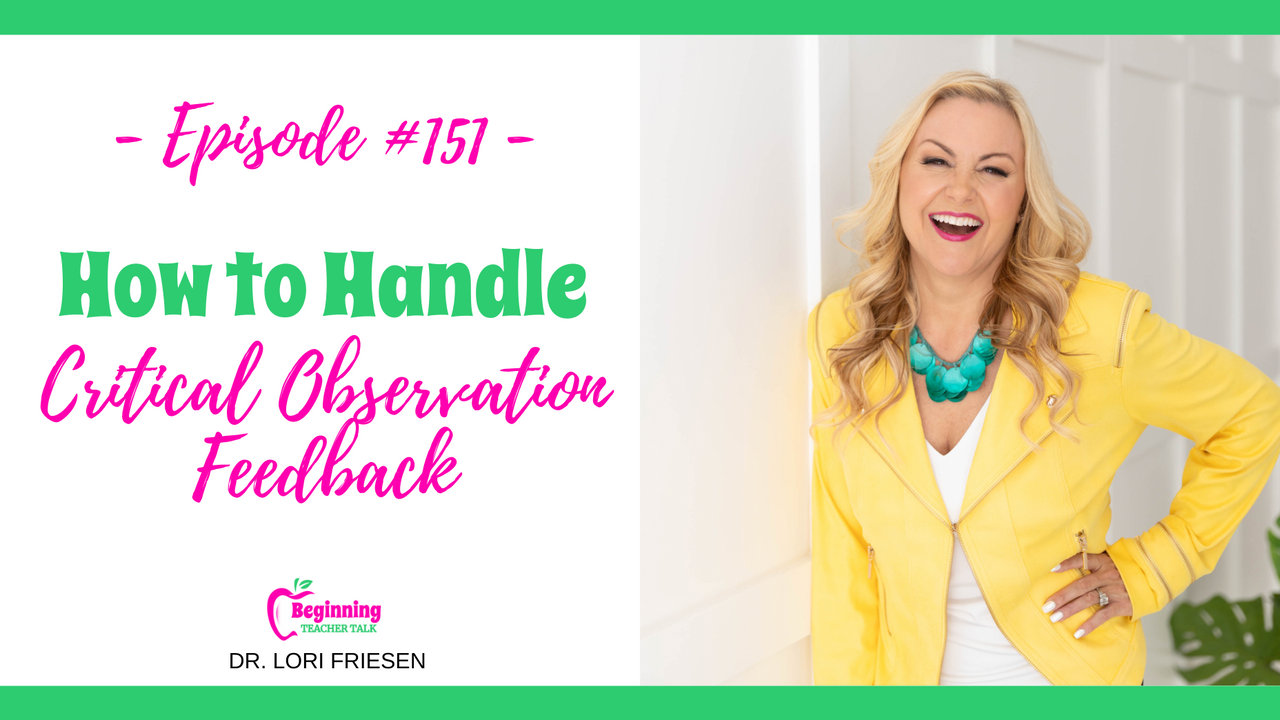How to Handle Critical Observation Feedback

Click the play bar below to listen to this week's show now:
Show Notes:
You’re heading into the second half of the school year in one of the most challenging years for education on record. Add in the exhaustion of being a new teacher plus things like critical observation feedback, and what do you get? Probably feelings that cause you to question your commitment to the profession. You might even be wondering whether or not you even want to do this job anymore. I get it. I remember feeling that way, too.
Formal observations are one of the things about teaching that really scares us as new teachers. They can just send you right into panic mode, whether you have a really supportive administration or not. You may even feel pretty competent in your teaching, but when another adult is in your room watching you, it’s a whole new level of nerves. You feel like every single move is being analyzed as if you’re under a microscope.
The most nerve-wracking part of a formal observation is what comes after the actual observation. The feedback. 😬 For me, because I cared so deeply about teaching, anything negative that I received on my formal observation hit me really hard. I’m talking immediate tears. I felt like I was trying so hard all the time. I was putting in so many hours, but my best never seemed to be good enough.
It wasn’t until I took what I thought was negative feedback to a teacher friend that I realized that my administrator actually wasn’t really criticizing me. They were just pointing out the areas that I needed to continue to work on, which is exactly what an observation is supposed to do. It's supposed to be an outside observation. It's supposed to be a tool for growth. That’s when my mindset shifted.
I realized that I was the one who was taking the feedback as criticism because I had impossible standards for myself. It's that expectation of I need to be perfect, that so often causes the anxiety that we're feeling. We think that when our administrator analyzes our teaching, we're supposed to be perfect. We think that anything less than perfect is failure. And it's that thought that is actually sending us into a tailspin.
Look, I agree that receiving a critical observation can really make you doubt yourself. It can feel really hard to keep going. The reality is that, yes, we are being observed. But, what if we reframed how we viewed observations? Rather than immediately feeling like we’re being judged, I encourage you to look at it as an opportunity. It’s an opportunity to get some great feedback from someone who's taught for a long time.
Even though it feels like you might be getting criticized more severely than you've ever been criticized, and maybe it's hard to even get up and go to school every day, I really want to help you to take a broader perspective in terms of what this means in your development as an educator. You can move past this phase of critical observation feedback with grace and with a little less stress and anxiety than you might be feeling right now.
It's my hope that after our conversation today, you're going to feel so much more empowered and positive, regardless of the type of feedback that you've been given. Yes, it’s hard. But it will get easier. I believe in you. I know that you will continue to grow, to challenge yourself, and to become the teacher that you've always dreamed of being.
Inside this week's show, you'll learn:
- Why sharing a seemingly negative observation with a teacher bestie can be extremely helpful and make you realize that we can often be our own worst critic.
- What the real purpose of an observation is and how to view it as an opportunity.
- How empowering it feels to take ownership of the things you want to work on and acknowledge the parts of teaching that are challenging for you.
- The trickiest part of handling critical observation feedback and how to avoid the “us versus them” mentality.
- What happens when you move past your fear and judgement of administration and see them as human beings who want to support you.
Links & resources mentioned inside this episode:
- Download 20 Self-Confidence Boosters for free.
- Check out the Beginning Teacher Talk TpT store.
- Join our Beginning Teacher Talk Private Facebook Group.
- Follow Dr. Lori on Instagram.
- Learn more about R.E.A.D.Y. for School Academy.
I hope this information is helpful as you prepare for your first, second, or third year of teaching. Until next time, remember, just because you're a beginning elementary teacher, there's no need for you to struggle like one.
💛 Lori
 Dr. Lori Friesen | Beginning Teacher Mentor
Dr. Lori Friesen | Beginning Teacher Mentor
Creator of the R.E.A.D.Y. for School Academy, Dr. Lori Friesen has mentored thousands of beginning teachers across the country through her workshops and courses. Host of the popular podcast, Beginning Teacher Talk, and creator of the innovative literacy program for 1st and 2nd grade, Dogs Help Kids Read and Succeed, Dr. Lori is dedicated to serving educators and inspiring learners. Learn more at drlorifriesen.com and at howdogshelpkids.com.
Want to listen on a different platform? Here are the links:
Click here to listen on Apple Podcasts.
Click here to listen on Spotify.
Click here to listen on Stitcher.
Click here to listen on iHeart Radio.
Related episodes you might enjoy:
- What Your Principal is (Really) Looking for in a New Teacher
- How to Feel Instantly More Confident as a New Teacher
- 4 Keys to Ultimate Student Engagement
- 7 Fantastic Classroom Management Hacks from Experienced Teachers
- Confidence Crushers: 3 Things to Stop Telling Yourself as a New Teacher
- How to Deal with Stress & Anxiety as a New Teacher
Follow:
Are you following my podcast? I release fresh, new content every single week and I don't want you to miss out! 💛 Click here to follow on Apple Podcasts.
Leave a Review ⭐️⭐️⭐️⭐️⭐️
If you are loving the podcast, I would be so grateful if you would leave me a review over on Apple Podcasts. Each time you leave a review, Apple Podcasts recommends my podcast to other new teachers so they feel a little less alone as they navigate their first few years of teaching. Just click here to review, select “Ratings and Reviews” and “Write a Review” and let me know how this podcast is helping you inside your classroom!
Stay connected for surprise goodies & updates!
Join our mailing list to receive the latest news from our team. 💛💕 Your information will not be shared.











